Rachel Held Evans's Blog, page 11
January 9, 2015
Follow Friday: Rev. Tiffany Thomas
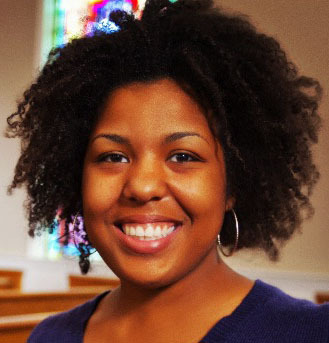
I’m adding a new feature to the blog this year where I highlight smart and inspiring people to follow on both social media and in life.
Today I’m thrilled to feature Rev. Tiffany Thomas, a twenty-eight-year-old pastor who is new to blogging and Twitter, but whose ministry I have admired for a while now.
Tiffany is the Senior Pastor of South Tyron Community Mission Church in Charlotte, North Carolina. She answered her call to ministry at the age of 15, and has been preaching, teaching and pastoring in the local church ever since. A graduate of Spelman College and Duke Divinity school, she molds her life after the strong belief that we are called to be agents of social and spiritual change.
To get a sense of Tiffany’s point-of-view, check out one of the first entries in her blog, “Shouting From the Front: Reflections of a Disorderly Woman Pastor.” An excerpt:
There are many books written that expound on the topic at length, some great some not so great. But you know what I think?
I think it is out of order for a woman to be a pastor.
There. I said it. It is entirely out of order for a woman to head the institution of the church. It goes against everything that we believe and affirm about the ideal distribution of power. As a female pastor, I am out of order.
But you know what? I worship a God who is out of order. We worship a God who constantly disrupts our boundaries of what is normal, correct, ideal. A God who constantly confused all by favoring the younger son over the elder son…that disrupts everything that we understand about power. A God who calls out that the first shall be last and the last shall be first…That disrupts everything that we understand about place.
You can read Tiffany’s blog here. Follow her on Twitter here. And check out this 2013 video from the UMC about Tiffany’s work.


January 8, 2015
Next stops: Chattanooga and NYC!
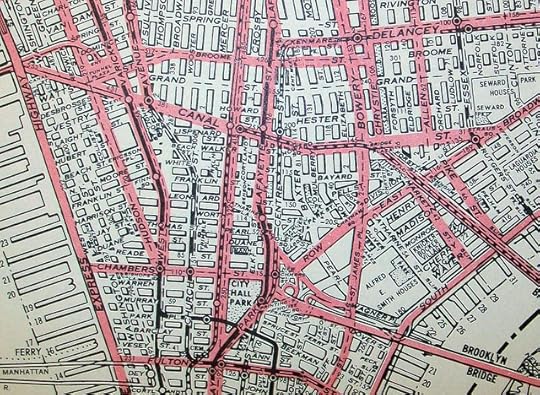
© 2012 davecito, Flickr | CC-BY | via Wylio
I’ve updated my speaking schedule for the winter and spring. Just like last fall, I’ve purposefully scaled back so I can be more present and engaged at the events in which I participate, though we may add a few more dates around the release of Searching for Sunday in April.
This Sunday, (January 11), I’ll be speaking just down the road in Chattanooga, Tennessee at St. Paul’s Episcopal Church during their Sunday School hour—9:15 a.m. For St. Pauls’ “kickoff Sunday,” I’ll be sharing pictures and stories from my year of biblical womanhood, inviting participants to think about the Bible as a conversation-starter, not a conversation-ender. You can learn more about the event here.
Later, January 22-24, I’ll be headed to New York City and Trinity Wall Street to participate in a panel discussion around economic inequality at the Trinity Institute’s Creating Common Good event. Speakers include Cornel West, Justin Welby, Barbara Ehrenreich, Nicole Baker Fulgham, and a bunch of other people who make me feel like I have no business speaking at this thing.
A cool aspect to this event is that a production crew from Trinity visited several of the speakers’ hometowns to highlight how economic inequality has affected people around the world. I was thrilled to introduce the crew to my friend Karla who works at a food pantry here in Dayton (Tennessee), and eager to talk about the unique challenges faced by people struggling with poverty in rural America. You can watch that video here, and the others here. Also, if you want to learn more about economic inequality ahead of the event (or won’t be able to attend the event), Cornel West—prominent intellectual, author, and cultural critic—will teach an online course on the subject in conjunction with ChurchNext, which is open to all from January 11-21. You can register here. (I already have!)
Check out the rest of my schedule for winter/spring 2015, which will bring me to Austin, Little Rock, Lancaster, and a bunch of places in between, and let me know if I’ll be seeing you!


January 7, 2015
Responding to Newsweek’s article on the Bible…
Here’s the original article by Kurt Eichenwald, which you should definitely read in its entirety before criticizing.
This post by Daniel Wallace does a good job looking at some of the textual issues at hand, but I also appreciate what Pete Enns says in his response, where he argues that Eichenwald’s piece was “naïve, over-the-top and basically right.”
Gives us lots to think about!
What did you think of the Newsweek piece? (Note: If you didn’t bother to read it, please don’t bother commenting! That’s a huge pet peeve of mine, having encountered multiple reviews of my own books written by people who admit they didn't even read them first.)


January 6, 2015
Ask a womanist biblical scholar…
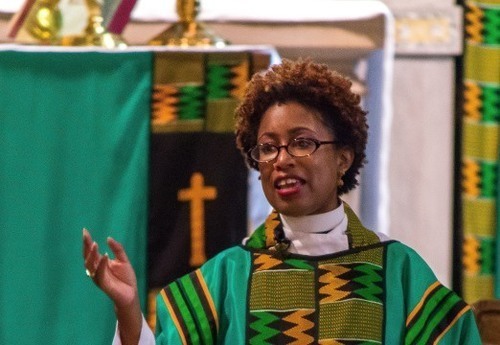
We’re picking up our popular “Ask a…” series in the new year, beginning with “Ask a womanist biblical scholar…”
The term womanism, first coined by author Alice Walker, is a social theory that emerges from the reality that feminism often fails to encompass and center the perspectives of Black women. Though womanism addresses racism and classism, its parameters and implications are still being explored, particularly among people of faith. Our guest today has suggested that the “principles of womanist preaching include affirming the dignity of Black women as legitimate interpreters of the Scriptures whether or not our interpretations converge with those of the dominant culture.”
The Reverend Wil Gafney, Ph.D. is Associate Professor of Hebrew Bible at Brite Divinity School in Fort Worth, Texas and is an Episcopal priest canonically resident in the Diocese of Pennsylvania and licensed in the Diocese of Fort Worth. A scholar of prophets, prophecy and prophetic texts in ancient Israel and surrounding cultures specializing in women prophets, she also specializes in womanist and feminist ways of reading scripture. A particular love is the Hebrew language - reading, teaching, studying - and classical rabbinic (Jewish) biblical scholarship.
Dr. Gafney is the author of Daughters of Miriam: Women Prophets in Ancient Israel, and the Peoples’ Bible, which she co-edited, available through Fortress Press. Other projects include an exploration of motherhood in messianic genealogies in “Mother Knows Best: Messianic Surrogacy and Sexploitation in Ruth” in Mother Goose, Mother Jones, Mommie Dearest: Biblical Mothers and their Children(Brill), and a commentary on Ruth and article on “Responsible Christian exegesis of the Hebrew Scriptures” in the African diasporic biblical commentary The Africana Bible (Fortress).
You can find her at her blog or on Twitter.
You know the drill! Leave a question in the comment section for Dr. Gafney and I’ll pick the top 6-7 to send to her for response. Be sure to use the “like” feature to vote on your favorites and look for the full interview sometime next week.
Ask away!


January 5, 2015
The Parents
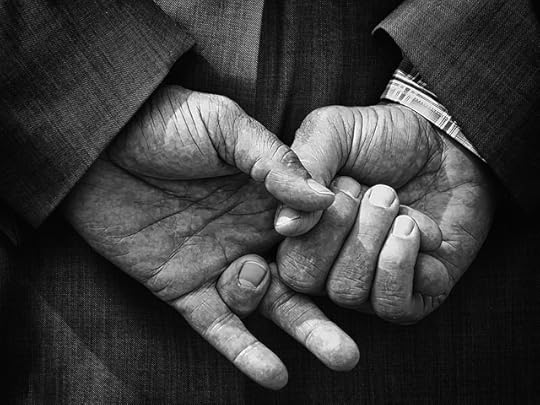
© 2014 Mark Spearman, Flickr | CC-BY | via Wylio
Back when I was terrified of public speaking, I’d approach the podium and, in my mind, drop a diaphanous curtain in front of the audience so I could look at them without seeing them, acknowledge their blur of faces without catching any doubt or disdain or incredulity that might lurk in their eyes.
I suppose I’m still a little terrified of public speaking, but I’ve since learned you can survive an awkward silence, a bungled transition, a not-so-funny joke without the people rising up and calling you a fraud. So I’ve sharpened my focus. I’ve started to see. And amidst the mostly-kind, sometimes-bored expressions, my eyes always lock on people whose faces betray a story welling up inside them. Those words I toss around so casually in my lectures—faith, doubt, fundamentalism, gender, sexuality, church— are potent seeds that have nestled, split, and grown inside of them, over many years, producing testimonies as unique and as urgent as the ones they print in Christianity Today, but without the tidy endings.
When it’s time to sign books, I’m given a pen, a chair, and a table, but I don’t need the chair or table. “There will be hugs,” I explain. It’s the most beautiful, exhausting, and inspiring part of the job: meeting the flesh-and-blood people who have connected to the flesh-and-blood me through the gossamer thread of words. Always I leave with a few tear stains on my collar. Always I leave more baffled and angry and awed by the Church than when I came. And sometimes I leave with homemade chocolate chip cookies.
I meet the bravest people in my travels. The young woman who was discouraged by her professors from pursuing ordination because of her gender, but who did it anyway. The 19-year-old who started a homeless ministry with his roommates. The lesbian couple that visited and were rejected by eleven churches before finding one that welcomed and valued them. The family that endured the excruciating process of extracting themselves from an abusive and controlling faith community. The pastor who told his congregation the truth about his doubts. The son of a Southern Baptist preacher who, at last, came out.
But often the stories that linger with me the longest are the stories of the parents.
In Louisville, a well-dressed, fifty-something mom who smelled of pressed powder and wore a stylish haircut and scarf, grasped both of my hands in hers and said, “We were forced to choose between our gay daughter and our church. We chose our daughter, and we haven’t looked back.” Behind her stood a quiet man wearing glasses and sweater vest—her husband. He smiled warmly at me, but wiped tears from his eyes.
In Columbus, a mother told me, “The church that baptized my son, that promised to love him no matter what, abandoned him when he came out. They tried to force him to change. But he can’t change. It doesn’t work like that. We’re proud of him and we love his new boyfriend. When all the other moms share exciting stories about their kids, I want so share exciting stories about mine, but I can’t. That church is our whole community, our support-system, but we feel like ghosts there, like outsiders looking in.”
In Phoenix, an older man approached the signing table, and with great difficulty choked out the story of a beloved son, a fundamentalist church, a suicide.
“I didn’t even learn the word ‘transgender’ until recently,” he said.
Sometimes, all I hear are the first few words of a story and the next thing I know I’m hugging someone and crying and raging inside because it shouldn’t be so damn easy to guess that a story that begins with, “we’re evangelical and our kid is gay” will end in heartbreak or tragedy.
Recent news has brought renewed attention to the often-fraught relationships between LGBT youth, their parents, and their faith communities. While I think it’s irresponsible to blame family and friends for a loved one’s suicide, I believe it’s just as irresponsible to ignore the reality that gay, lesbian, and bisexual youth are four times more likely to attempt suicide as straight peers, that nearly half of young transgender people have considered taking their lives, and that LGBT youth who come from families who reject their gender identities or sexual orientations are more than eight times more likely to attempt suicide than those who come from supportive families.
It’s irresponsible, too, to ignore the fact that LGBT people who seek religious counseling are more likely to commit suicide than those who seek secular counseling or none at all, that former advocates of “reparative therapy” are speaking out about its dangers, and that telling people their sexuality is inherently and uniquely disordered and disgusting produces more despair than hope. Something has to change in how people of faith respond to those among us who do not fit into rigid gender binaries or else these heartbreaking numbers won’t change.
And yet we cannot place the blame for yet another suicide squarely on the shoulders of parents when, too often, the religious communities these families turn to for guidance and support when a son or daughter comes out utterly fails them right when they need that support the most. We cannot hold parents accountable for ignorance regarding transgender identity without also holding accountable Southern Baptist leaders like Denny Burk who can’t be bothered to learn the most basic facts about what it means to be transgender before giving lectures, writing articles, and making resolutions condemning it a sin. We cannot point fingers at parents when anyone who has spent more than an hour in fundamentalist Christian culture knows that the shame, guilt, and fear that keeps so many people in the closet is the same shame, guilt, and fear that blames and misinforms their friends and family. We cannot condemn parents for not supporting their LGBT children without first asking them why they feel like they can’t, without first hearing the story of the father who told me, “I felt like Abraham. I believed I was being tested to see if I was willing to sacrifice my son in obedience to God.”
Just in these last few months, I have spoken with many parents who, even though they believed the voice telling them to sever their relationships with their children was the very voice of God, chose to put the knife down instead. It may seem to outsiders like an obvious choice, an imperative one, but for these parents, that choice involved walking away from the second-most important thing in their lives—their religion—at least for a time, at least until someone told them they didn’t have to choose after all.
I will never draw a stadium full of people to listen to my lectures. I’m lucky to fill a medium-sized church or a college lecture hall. Once, an event planer rather bluntly told me, “if you were Mark Driscoll, we’d have to open the overflow room.”
But that’s okay. When the diaphanous curtain lifts and when I embrace the flesh-and-blood people of this flesh-and-blood community of skeptics and misfits, doubters and dreamers, outcasts and rejects and kicked-to-the-curb believers, I am buoyed by your collective strength, charged by your limitless capacity to hope in spite of it all.
Many wounds are still open, but we will heal. And we will heal together.
***
For more from Christian parents of LGBT folks, check out Liz Dyer’s wonderful blog, PFLAG and Susan Cottrell’s book, Mom, I’m Gay. Do you have other recommendations for resources for parents? I'd love to include more.
See also:
Homosexuality, Evangelicalism, and the Danger of a Single Story
The False Gospel of Gender Binaries


December 31, 2014
Ode On A Blank 2015 Day Planner
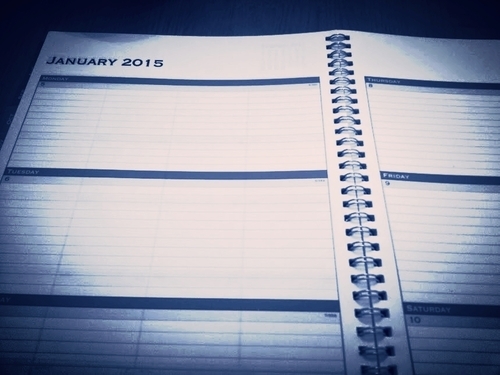
Thou still unravish’d bride of plastic tab dividers,
Your paper smelling crisp as an autumn morn,
You coax all my amorphous resolutions—more exercise, better books, a cleaner house—into ordered form,
Every tomorrow “fresh, with no mistakes in it”
Yet.
Filled calendars are sweet, but those unfilled are sweeter,
Therefore, ye empty lines, stretch on,
Before thy pristine pages are corrupted—by coffee stains and cancelled plans and to-do lists never done—
Every fresh tomorrow spoiled by today.
And yet...
If truth is beauty and beauty is truth,
I shall find truth within thy margins,
Where penciled-in dreams of fresh starts and success meet new mercies every morning.
If the promise is grace and if grace is enough, there is hope for us, Sweet Spiral-Bound, yet.
Happy New Year!


December 28, 2014
Sunday Superlatives: Best of 2014

© 2013 trombone65 (PhotoArt Laatzen), Flickr | CC-BY-ND | via WylioAround the Blogosphere…
Best Blogs of the Year:
Christena Cleveland
Richard Beck
Drew Hart
Ben Moberg
The Junia Project
Best Story:
Naomi Shihab Nye with “Gate A-4”
Best Photo:
Nadia Bolz-Weber and Phyllis Tickle Switch Bodies
Best Idea:
Laundry Love
Best Satire:
Bunmi Laditan with “How to Breastfeed Appropriately”
Best Poetry:
John Blase with “Do One Thing,” “Just a Hunch,” and “Vespers”
Best Insight:
Heather Kopp with “The Promise of Shared Brokenness”
“…People bond more deeply over shared brokenness than they do over shared beliefs.”
Best TED Talk:
Karima Bennoune with “The Side of Terrorism That Doesn’t Make Headlines”
Best Tip:
Mike Skinner with “Read the Bible Like a Texan, Y’all”
“In recent months I’ve repeatedly found myself giving the following advice: to read the Bible faithfully, read it like a Texan. Why, you ask, would anyone ever want to do that? Because a deficiency in the English language, combined with an already-present tendency towards individualism, has created an unhealthy distortion of the Christian faith. Luckily, Texans have already solved this problem with one of our favorite words: y’all.”
Best Series:
Rob Bell with “What is the Bible?” and Pete Enns with “Aha Moments: Biblical Scholars Tell Their Stories”
Best Challenge:
Efrem Smith with “The Privileged and The Poor”
“To dismantle poverty in this way, we not only need multi-ethnic congregations, we need multi-class congregations. Poor people ought to have a voice in the Church. They ought to have the opportunity to serve as elders, deacons, preachers, and board members alongside the Privileged. Putting all Privileged People in power and places of influence may be the American way, but it’s not the Kingdom of God way.”
Best Analysis:
Sandra Glahnd with “Act Like Men: What Does Paul Mean?” and Kristen Rosser with “The ‘Feminization’ of the Church”
Best Response:
Matthew David at Deeper Story with “What’s it like to be a gay Christian?”
Best Engagement:
James Hoskins at Christ and Pop Culture with “‘God’s Not Dead’ and the Angry Atheist Professor: That Was Not My Experience”
“I’m concerned that the movie God’s Not Dead perpetuates a false stereotype: that of the bully atheist philosophy professor who is out to destroy every Christian student’s faith. I’m sure there are some of those professors out there. But I doubt that they are a majority. Even if they were, though, I don’t think caricatures and stereotypes are helpful. When we uncritically accept a caricature of someone, we become less gracious people. Instead, we become more dismissive, presumptuous, and defensive. We also become more likely to misinterpret an honest challenge to our faith as an “attack,” and react in a way that is less than winsome.”
Funniest:
The Honest Toddler with “Open Letter to the Child I Hit at The Park”
Wisest:
Drew Hart with “Beyond a White Privilege Model”
“…A society dominated by white control can’t be fixed by white people taking control of the situation. The failure in the white privilege stewardship model, is that it inherently affirms and utilizes the very thing that it is called to resist and counter. If the answer to our racial problems is that white people must run things, call the shots, and be the saviors to the world, then we have missed the mark.”
Bravest:
Southern Baptist mom defends her transgender child and pastor Danny Cortez explains why he changed his mind about homosexuality
Truest:
Micha Boyett at On Faith with “Ghostly Grief: On Miscarriage and Loss”
Most Insightful:
Jeremy Courtney with “Behind #WeAreN: If One Group is Marked, We’re All Marked”
Most Honest:
Jamie Wright with “Not all pastors kids are Christians. Sorry.”
Most Powerful:
Shawn Smucker at Deeper Story with “Cough. Breathe. Cancer. Dance.”
“I watched her walk into the night, disappear into the darkness, and I thought, none are immortal. None of us will live here forever. We are, all of us, terminal.”
Most Helpful:
Gail Wallace at The Junia Project with “Defusing the 1 Timothy 2:12 Bomb”
Most Inspiring:
Austin Channing Brown with “The Impossible”
Most Likely To Make You See Things Differently:
Darlena Cunha at The Washington Post with “This is what happened when I drove my Mercedes to pick up food stamps”
Most Likely To Make You Cry a Little:
Sarah Bessey and The Work of The People with "You Are Not Forgotten"
Best Viral Video:
Sadie Doesn't Want Her Brother to Grow Up
Best Interviews:
Michelle Boorstein interviews Krista Tippett
Micky Jones interviews Walter Brueggemann
Inheritance interviews Kathy Khang and Helen Lee
Best Perspective:
Shauna Niequist with “She’s Not a Megachurch. She’s My Sister”
“You learn all sorts of things growing up the way I did. And one of them is this: the labels never suffice. The articles and blogs and books and outside opinions never will capture the real thing. They’ll reduce it to policy, numbers, data. They fail to capture what a church actually is: real live actual humans, showing up day after day, year after year, building something durable and lovely over time, together, with prayer and forgiveness and love.”
Best Tear-Jerker:
Nish Weiseth with “A Thank-You Note to Mumford and Sons”
Best Point:
Rachel Marie Stone with “The Birth Control Debate We Shouldn’t Be Having”
Most Popular Posts:
Walking the Second Mile: Jesus, Discrimination, and Religious Freedom
3 Things You Might Not Know About Proverbs 31
Most Popular Guest Post:
Samantha Field with "Leaving Home: Escaping the Stay-at-Home-Daughters Movement"
Most Popular Series:
"God & The Gay Christian" Book Discussion
Most Popular Interview:
“Ask a (Celibate) Gay Christian…”
Most Encouraging:
Finding a church where we belong
Most Rewarding:
Meeting so many readers and friends on the road
Could have spent hours with this group: pic.twitter.com/nXkuOeuXEm
— Rachel Held Evans (@rachelheldevans) November 8, 2014
Most Miraculous:
Watching little Juliette survive and thrive against all odds

Most Frustrating:
When, after 10,000 child sponsorships were dropped in protest, World Vision reversed its decision supporting LGBT employees. I was on the road speaking in North Carolina the day this happened and didn’t sleep a single minute that night. I’ve never felt so betrayed, disappointed and angry with my evangelical faith tradition. Still grieving over that one.
Biggest Personal Accomplishment:
Not Throwing Up on the POTUS at the White House Easter Prayer Breakfast—which was a close call given the fact that 24 hours earlier I had been totally immobilized by some of the worst food poisoning of my life, which caused me to miss my original flight into D.C. as I was too delirious and dehydrated to do anything but move from the bed to the toilet in my hotel room in Michigan. Thanks to a compassionate Delta agent, I was able to change the flight and get in just in time to look longingly at one of the most beautiful breakfast buffets I’ve ever seen in my life and shake the president’s hand (which is why I’m describing my illness as food poisoning and not a stomach virus…because I’d like to think my presence there did not compromise national security).
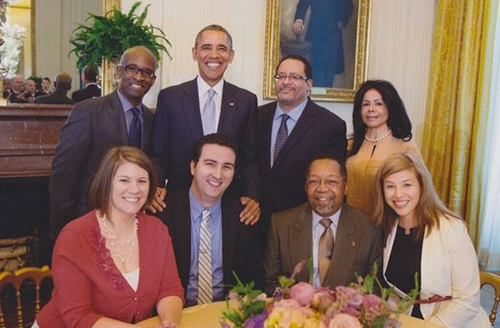
Second Biggest Personal Accomplishment:
Fitting a Week’s Worth of Travel in a Single Carry-On Backpack
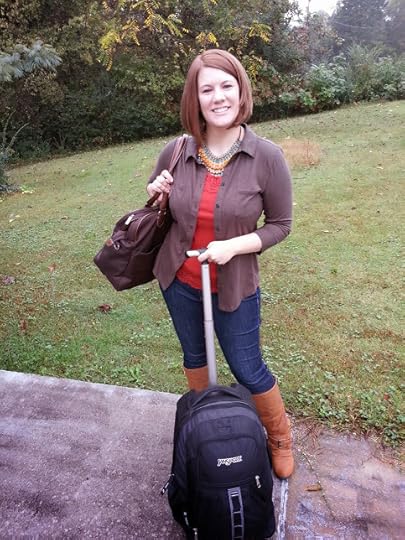
Third Biggest Personal Accomplishment:
Finishing Book #3, Searching for Sunday, which released April 14, 2015.
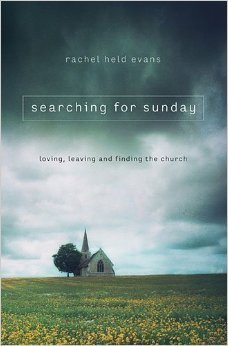
Best Discovery:
The Cumberland Trail—which is gorgeous, minutes away from our home, and continues to be developed
Biggest Blessing:
Dan. Every year, it’s Dan.
Best in Fiction:
Among novels that released in 2014, my favorite included All the Light We Cannot See by Anthony Doerr, Americanah by Chimamanda Ngozi Adichie, and of course Lila by Marilynne Robinson (which I’ve only just started).
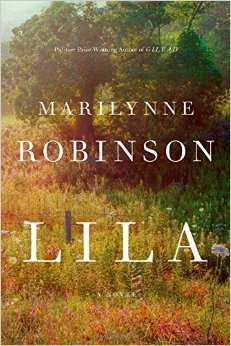
In preparation for Lila, I’ve been re-reading Gilead and Home, which has been, by far, the most enjoyable reading experience of the year for me. Some other favorite reads for me in 2014 include The Orphan Master’s Son by Adam Johnson (2012), And the Mountains Echoed by Khaled Hosseini (2013), and Where’d You Go Bernadette? By Maria Semple (2012).
Best in Nonfiction:
Among nonfiction reads that released in 2014, my favorite included The Bible Tells Me So by Peter Enns (read the review here), The Oldest Living Things in the World by Rachel Sussman, God and the Gay Christian by Matthew Vines, and Faith Shift by Kathy Escobar (read the review here).
The most influential book for me this year was probably Alexander Schmemann’s For the Life of the World, which I read and mined and pondered several times over in researching and writing Searching for Sunday.
And I finally got around to reading The Cross and the Lynching Tree by James Cone, which was just as shattering and powerful and informative as I’d been told. Of all the nonfiction I read this year, I expect this one will impact future reading the most.
Best in TV/Movies/Music/Podcasts…In TV this year, Dan and I enjoyed True Detective, Orange is the New Black, Alpha House (whose second season was way better than the first), The Cosmos, and (pleased don’t judge) Game of Thrones. We still watch reruns of 30 Rock, Arrested Development, and Star Trek: Next Generation. In movies, my very favorite was Philomena, which actually released in 2013 (see review here). We also enjoyed The Grand Budapest Hotel and Interstellar. As far as music, I can’t stop listening to Gregory Alan Isakov and The Head and The Heart. Favorite podcasts include The Liturgists Podcast, This American Life, and of course, Serial.
***
So, what makes your "best of the year" list?


December 23, 2014
From the Lectionary: Advent 4: Bringing God’s Dreams to Life
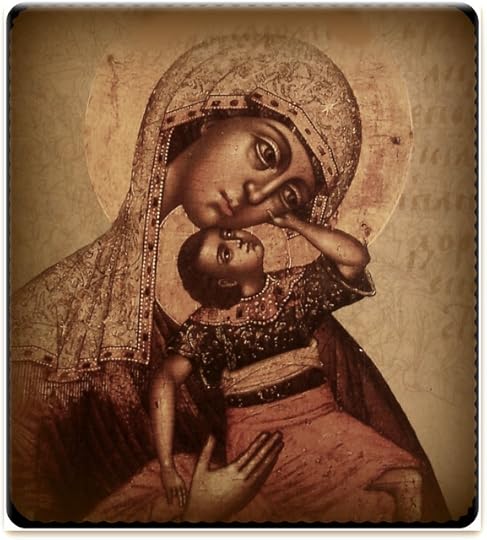
© 2010 Violette79, Flickr | CC-BY | via Wylio
I’m blogging through the lectionary this year, with an emphasis on the prophets this Advent season (See Advent 1, Advent 2, Advent 3), and today’s reading comes from Luke 1:39-56.
In those days Mary set out and went with haste to a Judean town in the hill country, where she entered the house of Zechariah and greeted Elizabeth. When Elizabeth heard Mary’s greeting, the child leaped in her womb. And Elizabeth was filled with the Holy Spirit and exclaimed with a loud cry, “Blessed are you among women, and blessed is the fruit of your womb. And why has this happened to me, that the mother of my Lord comes to me? For as soon as I heard the sound of your greeting, the child in my womb leaped for joy. And blessed is she who believed that there would be a fulfillment of what was spoken to her by the Lord.
And Mary said, “My soul magnifies the Lord, and my spirit rejoices in God my Savior, for he has looked with favor on the lowliness of his servant. Surely, from now on all generations will call me blessed; for the Mighty One has done great things for me, and holy is his name. His mercy is for those who fear him from generation to generation. He has shown strength with his arm; he has scattered the proud in the thoughts of their hearts. He has brought down the powerful from their thrones, and lifted up the lowly; he has filled the hungry with good things, and sent the rich away empty. He has helped his servant Israel, in remembrance of his mercy, according to the promise he made to our ancestors, to Abraham and to his descendants forever.” And Mary remained with her about three months and then returned to her home.
When we talk about Mary and the Magnificat, the words we tend to use are words like surrender, obedience, and yieldedness. These are good words, and indeed they capture much of Mary’s posture in this powerful and venerated prayer. But we have to be careful of ascribing too much passivity to Mary’s role in the Advent story and in the life of Jesus. Mary did not simply submit to God. Mary dreamed with God, aligned her hopes, plans, and actions with God. Mary birthed God.
Our Advent series thus far has focused on the importance of paying attention to the prophets. To pay attention to the prophets, we have learned, is to align our dreams with God’s dreams for the world and to live accordingly. It is to go all in, to bet everything that God’s justice will prevail and love will win.
Perhaps more than any other New Testament character, Mary paid attention to the prophets. From the prophets she knew that God favors the marginalized over the powerful, the weak over the strong, the poor over the rich. She knew that God scatters the proud and lifts up the humble, that God never gives up, always surprises, and always shows up.
From the prophets, Mary knew that God could very well use someone like her—an unmarried teenage girl, a minority in an occupied territory at a turbulent time in history— to bring the Messiah into the world in the most unceremonious way: through water and womb, blood and labor pains, lullabies and gentle kisses and the helplessness of a baby’s cries.
And so she said yes. She believed.
The Magnificat is not simply an act of surrender. It is a creative act, a prophecy and declaration in which Mary adds her own voice, her own dreams and her own plans for this baby to the dreams and plans of God. And I suspect these dreams affected Mary's decisions as she raised Jesus and helped shaped Jesus into the person he would become.
Mary is an example to all of us of how God not only challenges us to believe the impossible but also to participate in God’s creative work in the world and in our redemption. God is in the business of making all things new, and Advent reminds us that - impossibly, amazingly - this is a collaborative effort.
So as we move from Advent to Christmas, I invite you to MAGNFIY this God who prizes the humble and fills the hungry. I invite you to go all in, to place your bets on a God invested in making justice roll down like waters and righteousness like an ever-flowing stream. I invite you to take action, to collaborate with God and God’s people in beating swords into plowshares and spears into pruning hooks. I invite you to believe, as Mary did, that God uses ordinary people to make God’s dreams for the world come true.
***
For our entire Advent series, see Advent 1, Advent 2, and Advent 3.


December 19, 2014
Talking About the Holidays With My Kids (by Amy Julia Becker)
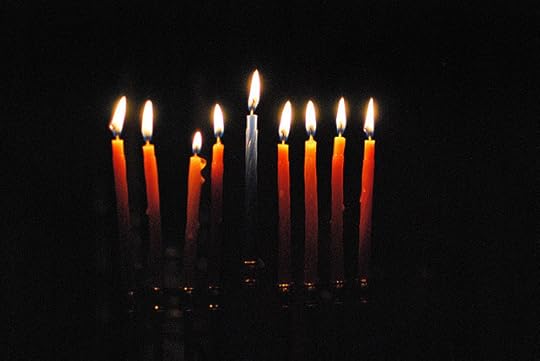
© 2009 slgckgc, Flickr | CC-BY | via Wylio
Today I'm thrilled to share a guest post about parenting, pluralism, and the holidays from the witty and wise Amy Julia Becker. Amy Julia is a columnist and blogger and the author of Small Talk: Learning from my Children about What Matters Most. What I love about Amy Julia's work is that it is always carefully-considered, balanced and insightful. Even when wading into controversial territory, Amy Julia consistently exhibits patience and grace. I hope you appreciate this post as much as I did.
***
“Should I put an x through Hanukkah on our calendar?” our six-year old son William asked when we turned the page to December.
I tried to hide my surprise at his question when I replied, “Why would you do that?”
“Because we aren’t Jewish,” he said. “Noah and Sarah at my school are Jewish. Noah’s grandfather even changed their name because he thought he might not get a job with a Jewish last name.”
I turned to face him.
If there’s one thing I’ve learned over this past decade of parenting, it’s that questions about religion demand my attention, and all the more so if they inadvertently reference a history of discrimination.
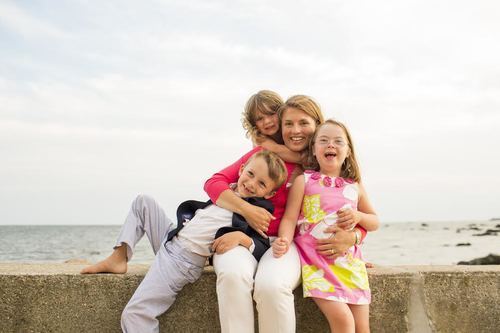
Photo by Chris Capozziello
William has learned a little about racial discrimination through Martin Luther King Day and conversations we’ve had about our complicated national history around the Fourth of July. But the idea that people kill each other in the name of God? We haven’t gotten there yet.
Still, his words—intended as a simple statement of fact about the different holidays celebrated among his friends—bring me back to high school history classes, learning how Christians persecuted Jews for centuries. His words bring me back to the first time my mother told me about the Holocaust, and how I wanted her to stop the car so I could escape from the knowledge of such horror. His words remind me of the passive acquiescence of clubs and schools and communities that denied entrance to those without Protestant qualifications.
When we turn the calendar to December, I’m usually looking for ways to teach my children about the religious underpinnings of Christmas. For them, it all blends together in a happy conglomeration of presents and carols and lights and cookies and nativity scenes, and I try to make sure that the story of a baby born in Bethlehem as a gift to the world doesn’t get completely overshadowed by “Jingle Bell Rock” and Santa and Home Alone. I even try to connect the two—the secular celebration and the spiritual message that God cares enough about our everyday lives, including the food we eat and the clothes we wear and the fun we experience, to enter into it in the form of a child.
I had been expecting questions about Christmas. But I hadn’t been thinking about Hanukkah at all. William’s simple statement made me realize I haven’t talked much about other religions with our children, and the particularities of our Christian practice flare up when I think about William comparing himself to Noah and Sarah. In this season, I want to affirm what we believe about Jesus. I want to introduce my kids to a God who is both personal and public, a God who hears their prayers about being afraid to go down the slide at school and who also cares about the systems of injustice and oppression in this world. And even as I uphold this peculiar and particular faith, I want to teach William to engage his friends and teachers with different faith backgrounds and commitments with deep respect.
I see three options. One, I can avoid the topic altogether, and pretend that faith is private enough that it doesn’t affect our relationships with friends. Two, I can relinquish everything that sets us apart as Christians and only talk about the values we hold in common with other religious communities. Or I can try to uphold the particularities of faith in a God who came to earth, a God who invites us to participate in a story of healing and grace and wholeness for all people. As Diane Eck writes for the Pluralism Project at Harvard University, “pluralism is not simply relativism, but makes room for real and different religious commitments . . . Pluralism is the process of creating a society through critical and self-critical encounter with one another, acknowledging, rather than hiding, our deepest differences.”
I choose pluralism, with some measure of fear and trembling. The only way I will teach my children not to repeat the abuses of the past is if I live out our faith as a way of humble, sacrificial love. The only way Christianity is good news for the world is if Christians live the Christmas message all year round—this message of a baby born in a stable, this message of peace, and hope, and joy.
For William, it wasn’t so complicated. He stood in the kitchen, pen in hand, poised for my directive. “Sweetie, you don’t need to cross out Hanukah on the calendar even though we aren’t Jewish,” I said. “We want to support our friends’ celebrations just like they support us when we celebrate Christmas.”
A week later, I sat in the audience at William’s school’s winter concert. He and his friends sang an old Shaker carol about the lamb. They offered an African-American spiritual about Emmanuel. They sang a Hannukah song with a Jewish student reading a history of the holiday. They performed a fun and silly round, complete with hand motions, inviting the light to come in during winter. It was a celebration of tradition, history, music, and religious diversity. The music honored each tradition without pretending they were all the same. For a moment at least, we were celebrating all together.
I’m glad we celebrate Christmas. And I’m glad Hanukkah shows up on our calendar.
***
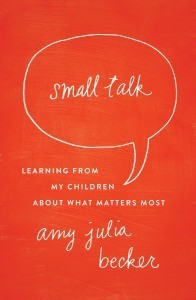
If you enjoyed this post, be sure to check out Small Talk: Learning from my Children about What Matters Most. In Small Talk, Amy Julia draws from the wisdom and curiosity of those young voices to reflect on beauty and kindness, tragedy and disability, prayer and miracles. As she moves through the basic questions her kids posed when they were very young to the more intellectual questions of later childhood she invites us to learn from our own day-to-day conversations with the children in our lives.
You can also find Amy Julia on Twitter, Facebook, and her blog.


December 17, 2014
Four Perspectives on Exodus
With the release last week of Ridley Scott’s Exodus: God and Kings generating interest and discussion around one of the Bible’s most epic dramas, I thought I’d invite some qualified and insightful guests to weigh in— not so much on the movie, but on the story behind the movie. What is the meaning and purpose of the Exodus? What can learn from this ancient story? What should viewers look for and question as they see it depicted on the big screen? Bringing insight to those questions are Nyasha Junior, Peter Enns, Rabbi Evan Moffic, and Kelley Nikondeha (who kindly responded to my eleventh-hour invitation to participate by writing a response last night). Hope you learn as much from the conversation as I did….
Nyasha Junior"Exodus Again"
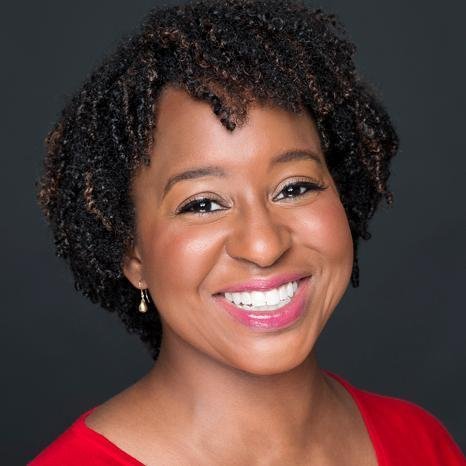
The new Exodus: God and Kings film is coming to theaters soon, but I’m not going to see it. Since I am a biblical studies professor, you might think that I would see it and organize a class field trip to see it again, but I’m choosing not to support Hollywood whitewashing.
I have fond memories of our family’s annual viewing of Cecil B. DeMille’s The Ten Commandments (1956), a classic retelling of the Exodus story. Long ago before DVRs and VCRs, we could only watch the film when it aired which was usually around Easter. The images from the film are forever imprinted on my mind, and I still think of Moses as Charlton Heston and Pharaoh as Yul Brynner. We didn’t call it whitewashing when I was a kid. It was just standard practice for Hollywood. The latest Exodus film continues that tradition. In almost 50 years, little has changed.
Still, all the talk of the film has caused me to reflect on the historic importance of the Exodus story for African-American Christians. We appropriated the story and wove it into our stories, songs, and sermons. Bricks without straw. Burning bush. Cloud by day, fire by night. Drowning Egyptians. Freedom! We have seen ourselves as the ancient Israelites and called our leaders “Moses.” God delivered the Israelites from slavery after hearing their cry and seeing how the Egyptians oppressed them, and we claimed this God of liberation as our own.
As a kid, the Exodus story was a feel-good story of liberation that provided the backdrop for a riveting dramatic film and for my pastor’s equally captivating sermons. As an adult, I now interpret it as a story of oppressed becoming oppressors. God hears the cry of the Israelites but not the Canaanites and other peoples in the what the Israelites regard as their “Promised Land.” As well, I no longer understand the Exodus as a story of liberation for African-Americans. Emancipation did not bring about an end to lynchings, segregation, and racial discrimination. For African Americans, there was no deliverance from their oppressors, and there was no Promised Land. Despite significant gains, for African Americans in the 21st century, in some ways, little has changed.
Nyasha Junior is an Assistant Professor of Old Testament/Hebrew Bible at Howard University School of Divinity. Visit her website and follow her on Twitter at @NyashaJunior.
Peter Enns
"Battle of the Gods"
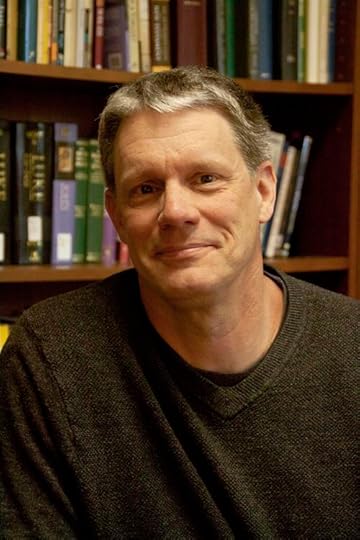
Those of us raised on Cecil B. DeMille’s The Ten Commandments know all about the exodus story. A burning bush, “Let me people go,” Joshua has a girlfriend, Charlton Heston breaks up with Anne Baxter so he can marry Herman Munster’s wife (Yvonne De Carlo), slaves are delivered from Yul Brenner’s clutches, and Edward G. Robinson (“Where’s your Moses now?”) undermines the whole thing.
But when reading the biblical story of the exodus, it’s best to forget this classic. In fact, it might be best to forget VBS and a few sermons.
The story of the exodus is not about a bunch of random plagues to liberate slaves and then another random, but more awesome, trick about splitting the Red Sea. The story is about Israel’s God—the God who lives on a mountain down south somewhere, whose subject are an enslaved people—marching onto the home field of the superpower of the day and beating up their army and their gods.
Think of how the story begins. The Israelites increase in number, but Pharaoh enslaved them so they might serve him (1:13). Later Yahweh commands Moses to tell Pharaoh to “Let my people go so they might worship me” (7:16).
“Serve” and “worship” are the same word in Hebrew, `avad. THE question in exodus plays off of this double meaning: will Israel `avad (“serve”) Pharaoh and his gods as slaves or will Israel `avad (“worship”) Yahweh as his people on Mt. Sinai.
Exodus is about who will earn the right to lay claim to the people of Israel: Yahweh or Pharaoh and his gods. What follows is a no-holds-barred battle of the gods. Who will win? Whom will Israel “serve?”
Pharaoh responds to Moses’s first challenge: “I do not know Yahweh and I will not let my Israel go” (5:2). For the next few chapters, Yahweh will introduce himself to Pharaoh through plagues and the parting of the Red Sea, a cosmic battle where Yahweh takes to task the Egyptian pantheon one by one.
For example, the Nile—Egypt’s source of life and deified in the Nile god Hapi—is turned to blood. The plague of frogs is a slap in the face to Heqet, the goddess of fertility, who was depicted with the head of a frog. The plague of darkness is a kick in the midsection to the sun god Ra, who is also Pharaoh’s patron god. Exodus 12:12 sums it up nicely: “…on all the gods of Egypt I will execute judgment: I am Yahweh.”
Then we have the parting of the Red Sea—hardly a random act, but a replay of Genesis 1 (Day 3): in both the waters of chaos are separated, revealing habitable dry ground beneath. Genesis 1 is itself an echo of older Mesopotamian and Canaanite creation stories, where chaos/water is tamed and split by the victor god.
The message of the exodus is: Yahweh and Yahweh alone lays claim to his people, and he alone is worthy of worship. He is the creator and the redeemer—and the defeated Egyptian army and Egypt’s subdued gods bear witness to it.
Peter Enns is a biblical scholar, author, and blogger who teaches Old and New Testament courses at Eastern University. You can read more about Exodus in his latest book, The Bible Tells Me So.
Rabbi Evan Moffic"The Long Walk to Freedom"

The Exodus movie film premiers in mid-December, and with my new book What Every Christian Needs to know about Passover coming out shortly and describing how Jews and Christians can bring the Exodus story to life today, I have lucky timing.
Yet, the stories of the Bible are timeless, and Hollywood seems to recognize that people yearn to experience them. The Exodus story, in particular, has an extraordinary and often overlooked message.
Why We Usually Get the Story Wrong
Usually the story is told as a clash of wills and egos between God and Pharaoh. God, using Moses as His messenger, vanquishes Pharaoh and the Egyptian people. The Israelites go free. Everyone is happy.
Yet, if we read the Bible, we know it takes 40 years before the Israelites are truly free. They have to journey in the wilderness—confused, uncertain and angry—before they enter into the Promised Land.
Why? Simply looking at a map shows us the journey from the Egypt to Israel is not a long one. Scholars estimate it would take about 3 weeks or so to walk it. Why does it take the Jewish people 40 years?
The Real Lesson of the Exodus
Jewish folk wisdom gives us a memorable answer: “It took 4 days to take Israel out of Egypt. It took 40 years to take Egypt out of Israel.” The Israelites had been slaves for 400 years. They could not become a free people overnight.
History is littered with examples of people trying and failing to become free. Look at France after 1789 Revolution. After a few years of chaos, tyranny returned in the form of Napoleon. Look at Egypt after the overthrow of Hosni Mubarek. After some confusion and an election, the army reasserted control.
Freedom takes time. Before they had freedom, the Jewish people had to learn responsibility. They had to build community. They had to create new institutions. In other words, they had to undergo what Nelson Mandela would later call “The Long Walk to Freedom.”
Are We Free?
This lesson matters for each of us as well. True freedom is discovered not in the absence of responsibility. It is found when we embrace it. For Jews the symbol of embracing responsibility is accepting the Torah from God at Mount Sinai. That is the most important part of the Exodus: not the plagues, not the splitting of the red sea, not even Moses saying to Pharaoh “Let me people go.” Freedom begins in responsibility.
If this idea seems too abstract, consider a parent and a child. When a young child crosses a street, a parent needs to hold their hand. Over time, parents teach the child to look both ways, to follow the traffic signs, and to be careful. Once the child has internalized those rules--once it becomes part of their normal behavior—they do not need to hold a parent's hand. Through internalizing the rules—through having faith in them—they become able to do more on his own. They gain a measure of freedom.
Praying Our Way to Freedom
Freedom and responsibility truly go hand in hand in our spiritual lives. The greatest spiritual freedom as the capacity to grow and change. We are not stuck where we are. We can continue to grow closer to God throughout our lives. But it takes work. It takes responsibility.
For me the best indicator of this responsibility is prayer. When I am praying regularly—in the morning and the evening—I know I am nurturing my inner life. It does not always happen. Sometimes the day seems to fill with appointments and obligations. But if I go too long without regular prayer, my mind and soul wither. I seem to lack the freedom to grow.
The battle between God and Pharaoh was only the beginning. The challenge of the Exodus remains with each of us today. As individuals and as a community, we walk along the long road to freedom.
Where does freedom and responsibility meet for you? What practices for you ensure the Exodus remains relevant today?
Rabbi Evan is the spiritual leader of Congregation Solel in suburban Chicago. He blogs at www.Rabbi.me and the Huffington Post. Author of Wisdom for People of All Faiths, his next book What Every Christian Needs to Know about Passover, is available February 2015 from Abingdon Press.
Kelley Nikondeha"Exodus Strong"
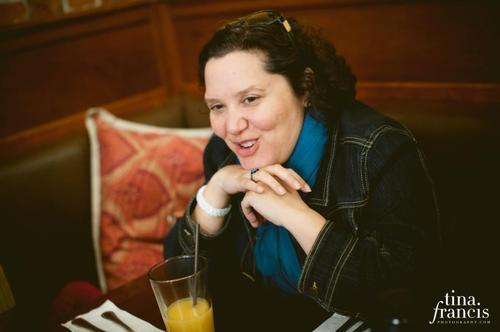
Exodus is a liberation song that begins in the brickyards of Egypt where the Hebrews are enslaved to Pharaoh, cruel taskmasters and backbreaking quotas. But it’s a song sung by women and not only the man who seems central to the story.
The truth is that there would be no Moses, no crossing of the Red Sea and no grand tale of liberation if it weren’t for the women woven throughout Exodus. These women on both sides of the Nile River exhibited a subversive strength that pushed back against Pharaoh’s edict of death, saving one boy who went on to save an entire people.
The midwives were clever and courageous in the face of a tyrant. Jochabed, Moses’ mother, practiced wild hope as she placed her baby on a raft of reeds, sending him across the waters of the Nile. An adolescent Miriam showed bravery beyond her years, approaching an Egyptian elite on behalf of her brother. Bithiah, Pharaoh’s daughter, enacted a bit of restitution with the audacious adoption of a Hebrew boy she drew from the water. These women, separately and in solidarity with one another, made Moses possible.
A mother who nursed him on lullabies and stories of old, the plaintive laments of bereft mothers, the songs yearning for freedom rising from the brickyards – they all shaped him. Moses followed in the wake of these women as he went toe-to-toe with Pharaoh. Their example and even their songs raised a revolutionary liberator.
Exodus women took risks, harnessed their intelligence and gathered their resources to enact justice in many small ways that overturned an empire. Moses, in the company of such women, liberated and led the Hebrews. Miriam became a prophet and partner to her brother for years to come. They are the unsung heroes, Exodus strong, singing freedom.
Kelley Nikondeha is a lover of God's justice & jubilee. She is the co-director and chief storyteller for Communities of Hope, a community development enterprise in Burundi. She is a practical theologian at heart, weaving story and Scripture together to create fresh insight and cultivate faithful practice among communities who follow Jesus. Find her blog here.
***
What would you add about the Exodus epic? Have you seen the movie? What did you think?


Rachel Held Evans's Blog
- Rachel Held Evans's profile
- 1710 followers



